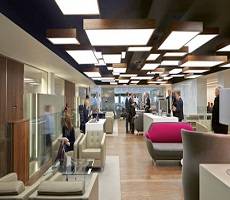January 6, 2014
New SkyCycle route proposed to ease Capital’s transport network congestion
 Demand for London-based workplaces is increasing, but the capital’s transport network is at capacity and ill equipped for a predicted population growth of 12 per cent over the next decade. Despite the Mayor’s efforts to encourage more cycling in the capital, a recent series of accidents has raised concerns about its safety. Architects Foster + Partners together with Exterior Architecture and urban planners Space Syntax have come up with a proposed solution, the SkyCycle network. This consists of a wide, secure deck constructed above the existing suburban railway corridors, to provide over 220 kilometres of safe, car free cycle routes which can be accessed at over 200 entrance points. Each route can accommodate 12,000 cyclists per hour and will improve journey times by up to 29 minutes. More →
Demand for London-based workplaces is increasing, but the capital’s transport network is at capacity and ill equipped for a predicted population growth of 12 per cent over the next decade. Despite the Mayor’s efforts to encourage more cycling in the capital, a recent series of accidents has raised concerns about its safety. Architects Foster + Partners together with Exterior Architecture and urban planners Space Syntax have come up with a proposed solution, the SkyCycle network. This consists of a wide, secure deck constructed above the existing suburban railway corridors, to provide over 220 kilometres of safe, car free cycle routes which can be accessed at over 200 entrance points. Each route can accommodate 12,000 cyclists per hour and will improve journey times by up to 29 minutes. More →





























January 10, 2014
SkyCycle. Great idea, but how realistic is it really?
by Andrew Brown • Comment, Environment, Facilities management, Workplace
A cycle lane in the sky is a brilliant concept. The very name conjures up visual images of 21st century transport networks that HG Wells might have been proud of. But wedged above the Enfield Town to Liverpool Street line or its equivalent it seems very unlikely. So let’s assume this is an exercise in marketing, making use of good research and creative design as a means to kick start the debate about how we get to work and how we can accommodate more different and more sustainable methods of commuting. And let’s not restrict this to London either. The capital might have more obvious issues, more publicity; a larger than life Mayor; plus too many cycling fatalities, but they are problems shared across the UK.
More →